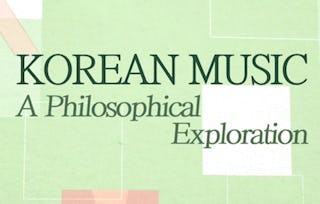This course will give you the cultural and historical background to begin your journey into Korean philosophy, and there is no prerequisite knowledge on philosophy required. Anybody who either has an interest in Korean culture, maybe through K-Dramas or K-pop, or an interest in philosophy from a cross-cultural perspective, are all welcome.

Introduction to Korean Philosophy and Culture
5 days left! Gain next-level skills with Coursera Plus for $199 (regularly $399). Save now.

Introduction to Korean Philosophy and Culture
This course is part of Korean Philosophy Essentials Specialization

Instructor: SO JEONG PARK
19,126 already enrolled
Included with
(217 reviews)
What you'll learn
Compare Korean philosophy with both Chinese philosophy as well as Western philosophy
Explore the field of Korean philosophy and its development through its continued innovation
Discuss the key ideas in Korean philosophical debates, such as the concepts of moral emotions and everyday feelings
Reflect the Korean philosophical traits reflected in Korean language
Skills you'll gain
Details to know

Add to your LinkedIn profile
See how employees at top companies are mastering in-demand skills

Build your subject-matter expertise
- Learn new concepts from industry experts
- Gain a foundational understanding of a subject or tool
- Develop job-relevant skills with hands-on projects
- Earn a shareable career certificate

There are 4 modules in this course
This week, we’re going to look at what Korean philosophy is, and what makes it different from the Western philosophy that you might be accustomed to. We’ll also be looking at Chinese philosophy in comparison to Korean philosophy, because it has had a large influence on the evolution of Korean philosophy.
What's included
9 videos2 readings1 assignment2 discussion prompts
This week, we will look at how Koreans formed their own culture and ideas. What we consider to be “Korean” today is the result of their long-standing self-awareness and tenacious practice of reconstructing the cultures from outside. Among them, the Chinese culture had the deepest influence on pre-modern Korea. We will explore ways Koreans have adapted and innovated at cultural boundaries.
What's included
9 videos1 reading1 assignment1 discussion prompt
This week, we will cover two traits that are often used to describe Koreans: One is “Koreans are affectionate” and the other is “Koreans are argumentative.” We will focus on these two seemingly contradictory characteristics of Koreans and revisit the two famous debates in the history of Korean philosophy: the Four-Seven Debate and the Horak Debate.
What's included
8 videos1 reading1 assignment2 discussion prompts
Koreans have developed their way of thinking by innovating on knowledge at cultural boundaries. What they developed are reflected in contemporary Korean language. This week, we are going to talk about the core ideas of Korean philosophy that have endured up till now. We’ll see how we can think differently about the world through these ideas.
What's included
8 videos1 reading2 assignments1 peer review1 discussion prompt
Earn a career certificate
Add this credential to your LinkedIn profile, resume, or CV. Share it on social media and in your performance review.
Instructor

Offered by
Explore more from Philosophy
 Status: Preview
Status: PreviewSungkyunkwan University
 Status: Free Trial
Status: Free TrialSungkyunkwan University
 Status: Free Trial
Status: Free TrialSungkyunkwan University
 Status: Free Trial
Status: Free TrialSungkyunkwan University
Why people choose Coursera for their career

Felipe M.

Jennifer J.

Larry W.

Chaitanya A.
Learner reviews
- 5 stars
90.32%
- 4 stars
5.99%
- 3 stars
2.30%
- 2 stars
0.92%
- 1 star
0.46%
Showing 3 of 217
Reviewed on Oct 1, 2023
The Zoom lesson was cringey, but I enjoyed most everything else. I wish the readings had been accessible through my library; I had to skip a lot of them because I couldn't source the material.
Reviewed on Sep 30, 2021
I am so impressed with this course. Many I have just known about Korean
Reviewed on Jul 2, 2021
although it's a bit boring there are many things that I get and understand rather than just assuming that philosophy in Korea is the same as Asian philosophy as a whole
Frequently asked questions
To access the course materials, assignments and to earn a Certificate, you will need to purchase the Certificate experience when you enroll in a course. You can try a Free Trial instead, or apply for Financial Aid. The course may offer 'Full Course, No Certificate' instead. This option lets you see all course materials, submit required assessments, and get a final grade. This also means that you will not be able to purchase a Certificate experience.
When you enroll in the course, you get access to all of the courses in the Specialization, and you earn a certificate when you complete the work. Your electronic Certificate will be added to your Accomplishments page - from there, you can print your Certificate or add it to your LinkedIn profile.
Yes. In select learning programs, you can apply for financial aid or a scholarship if you can’t afford the enrollment fee. If fin aid or scholarship is available for your learning program selection, you’ll find a link to apply on the description page.
More questions
Financial aid available,
¹ Some assignments in this course are AI-graded. For these assignments, your data will be used in accordance with Coursera's Privacy Notice.





